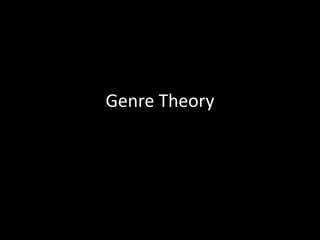
Genre Theory
- 1. Genre Theory
- 2. What is genre? A genre is the category a media text is placed in due to the presence of certain conventions and characteristic. Examples of genres are: • Romance • Horror • Sci-fi • Thriller • Action • Fantasy
- 3. Barry Keith Grant Media texts are sorted into categories (genres) so that audiences can easily identify them and know what to expect. Audiences can then develop a liking for a certain genre and delve deeper into it.
- 4. Steve Neale Neale argues that genres are processes of systemization rather than systems. This is because they are dynamic and evolve over time.
- 5. Things that are consistent within a genre • Typical mise-en-scene • Typical types of narrative • Generic characters • Typical studios/production companies • Typical personnel • Typical sound design • Typical editing style
- 6. Jason Mittel Mittel argues that genres are cultural categories that are sold by industries to audiences. Familiar codes and conventions are used to appeal to audiences and and relate to certain references. Genre allows audiences to choose what they want to consume in order to fulfill certain pleasures.
- 7. Rick Altman Altman argues that there are several pleasures that audiences use media texts to fulfill: • Emotional pleasures – these are particularly significant when they generate a strong audience response • Visceral pleasures – when a film’s stylistic construction causes physical effects on the audience • Intellectual puzzles – these allow the audience to solve them and feel a sense of accomplishment
- 8. Strengths of genre theory • Everyone uses and understands it • It can be applied across a wide range of texts • It allows audiences to choose what they want to consume • It allows producers to choose what they want to create in order to appeal to audiences
- 9. Christian Metz Metz argues that genres go through a certain process during their lifetime: • Experimental stage • Classic stage • Parody stage • Deconstruction stage
- 10. Music videos Music videos are a medium with many sub- genres. They are a post-modern way of promoting music and attaching a persona to the artist. They often parody genres or recreate them. The genre conventions stay the same but the style changes throughout the different music genres.
- 11. David Bordwell ‘Any theme may appear in any genre.’ For example: • Teen angst • Romance • Nihilism • Romance • Coming of age rituals • Tribalism • Hedonism
- 12. David Buckingham He states that genre is not given by the culture, it is a process of negotiation and change. Genres are not fixed – they change and evolve over time. For example, short films and music videos are in the process of genre cross-over.